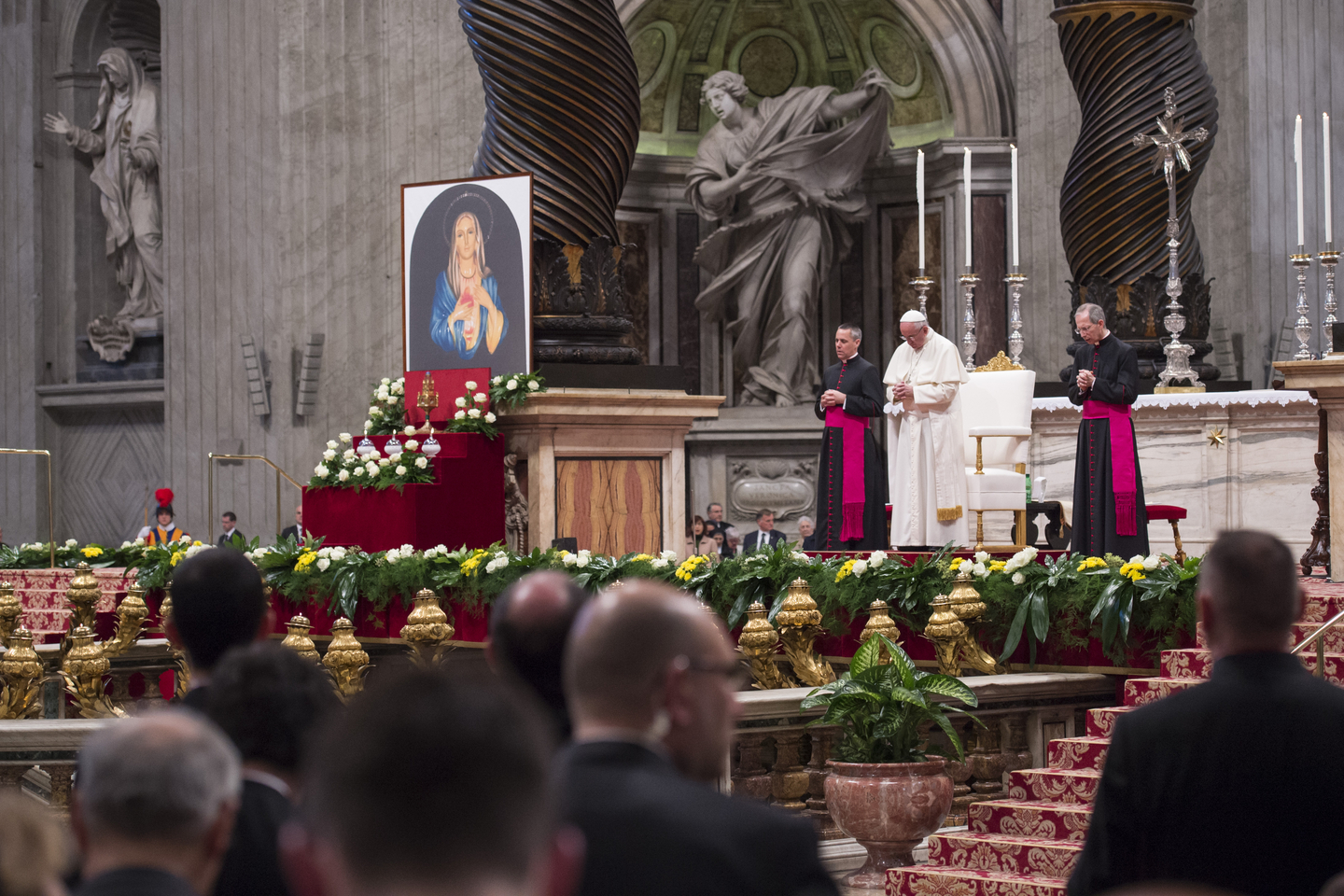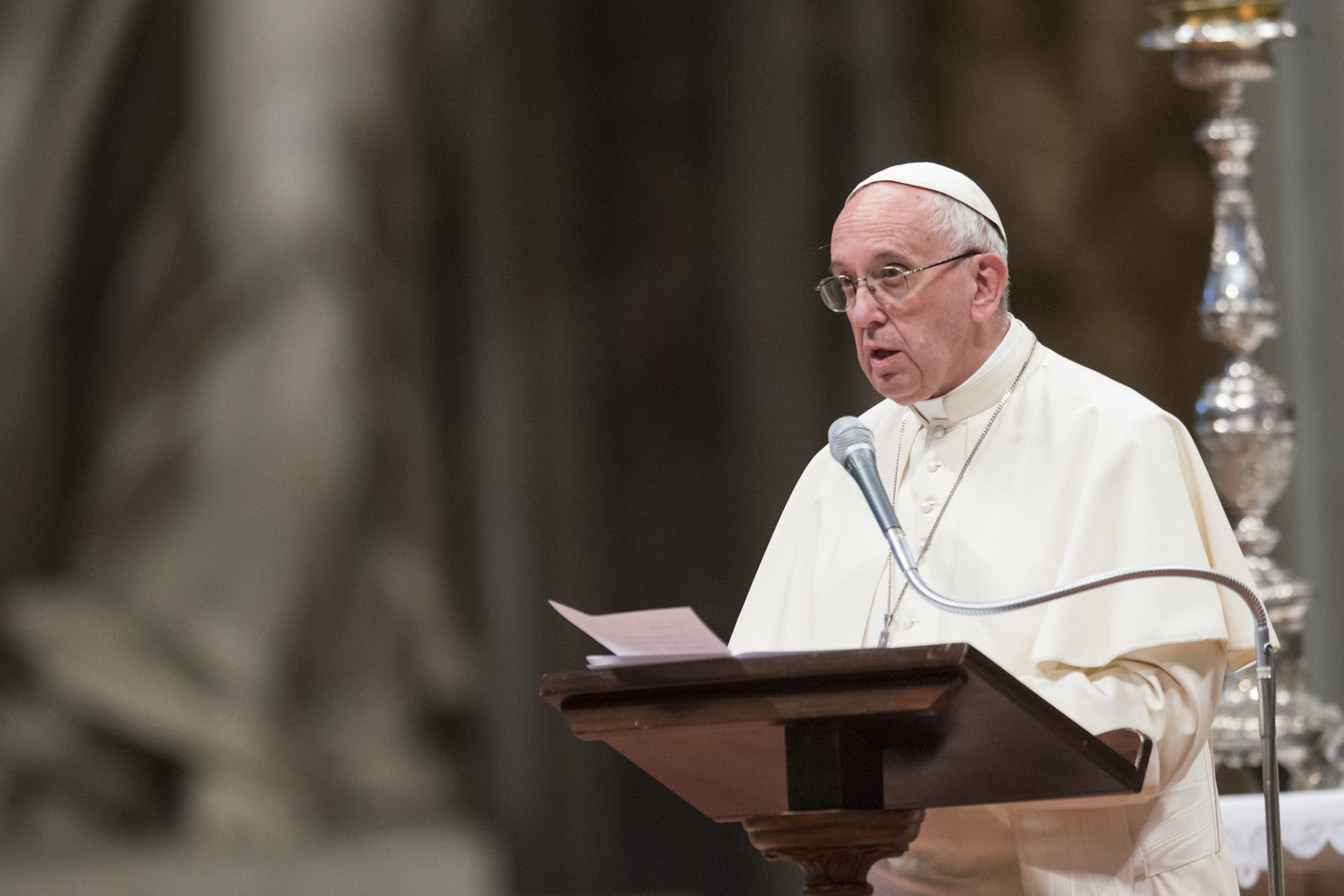VATICAN CITY — Pope Francis on Thursday presided at an evening prayer vigil in St. Peter’s Basilica, to express one of the great spiritual works of mercy: “to console the afflicted.”

The prayer vigil “to dry tears” coincided with the Vatican’s traditional celebration of the Solemnity of the Lord’s Ascension into Heaven. The vigil began with three testimonies. The first was offered by a family who lost a son and brother to suicide.

A second testimony came from a Catholic Pakistani journalist who was forced to flee his country as a political refugee with his family, after Islamic terrorists threatened their lives.

The third witness was given by twin brothers who, having sought happiness in the delights of this world, experienced a conversion to Christ through their mother’s prayers and tears. In each of the three witnesses, faith in Jesus Christ was decisive in transforming suffering into hope.

The testimonies alternated with scriptural readings and the lighting of a candle before the reliquary of “Our Lady of Tears” of Syracuse, which was brought especially to the Vatican for the vigil, to be venerated by the faithful.

After the reading of the Gospel of the ‘beatitudes,’ Pope Francis delivered a consoling address in which he told those present that “in our pain, we are not alone,” since “Jesus, too, knows what it means to weep.”

During the vigil, intercessory prayers were also offered, particularly for Christians who are being persecuted for their faith; victims of medical experimentation and all forms of slavery; children who are suffering or abused; the sick; those who live in loneliness, abandonment, and desolation; and those who are grieving the loss of a loved one.
Here below we publish the official English text of the Pope’s address.

Dear Brothers and Sisters,
After the moving testimonies we have heard, and in the light of the word of the Lord that gives meaning to our suffering, let us first ask Holy Spirit to come among us. May he enlighten our minds to find the right words capable of bringing comfort. May he open our hearts to the certainty that God is always present and never abandons us in times of trouble. The Lord Jesus promised his disciples that he would not leave them alone, but at all times in life he would remain close to them by sending his Spirit, the Comforter (cf. Jn. 14:26) to help, sustain and console them.
At times of sadness, suffering and sickness, amid the anguish of persecution and grief, everyone looks for a word of consolation. We sense a powerful need for someone to be close and feel compassion for us. We experience what it means to be disoriented, confused, more heartsick than we ever thought possible. We look around us with uncertainty, trying to see if we can find someone who really understands our pain. Our mind is full of questions but answers do not come. Reason by itself is not capable of making sense of our deepest feelings, appreciating the grief we experience and providing the answers we are looking for. At times like these, more than ever do we need the reasons of the heart, which alone can help us understand the mystery which embraces our loneliness.
How much sadness we see in so many faces all around us! How many tears are shed every second in our world; each is different but together they form, as it were, an ocean of desolation that cries out for mercy, compassion and consolation. The bitterest tears are those caused by human evil: the tears of those who have seen a loved one violently torn from them; the tears of grandparents, mothers and fathers, children; eyes that keep staring at the sunset and find it hard to see the dawn of a new day. We need the mercy, the consolation that comes from the Lord. All of us need it. This is our poverty but also our grandeur: to plead for the consolation of God, who in his tenderness comes to wipe the tears from our eyes (cf. Is 25:8; Rev 7:17; 21:4).
In our pain, we are not alone. Jesus, too, knows what it means to weep for the loss of a loved one. In one of the most moving pages of the Gospel, Jesus sees Mary weeping for the death of her brother Lazarus. Nor can he hold back tears. He was deeply moved and began to weep (cf. Jn 11:33-35). The evangelist John, in describing this, wanted to show how much Jesus shared in the sadness and grief of his friends. Jesus’ tears have unsettled many theologians over the centuries, but even more they have bathed so many souls and been a balm to so much hurt. Jesus also experienced in his own person the fear of suffering and death, disappointment and discouragement at the betrayal of Judas and Peter, and grief at the death of his friend Lazarus.
Jesus “does not abandon those whom he loves” (Augustine, In Joh., 49, 5). If God could weep, then I too can weep, in the knowledge that he understands me. The tears of Jesus serve as an antidote to my indifference before the suffering of my brothers and sisters. His tears teach me to make my own the pain of others, to share in the discouragement and sufferings of those experiencing painful situations. They make me realize the sadness and desperation of those who have even seen the body of a dear one taken from them, and who no longer have a place in which to find consolation. Jesus’ tears cannot go without a response on the part of those who believe in him. As he consoles, so we too are called to console.
In the moment of confusion, dismay and tears, Christ’s heart turned in prayer to the Father. Prayer is the true medicine for our suffering. In prayer, we too can feel God’s presence. The tenderness of his gaze comforts us; the power of his word supports us and gives us hope. Jesus, standing before the tomb of Lazarus, prayed, saying: “Father, I thank you for having heard me. I knew that you always hear me” (Jn 11:41-42). We too need the certainty that the Father hears us and comes to our aid. The love of God, poured into our hearts, allows us to say that when we love, nothing and no one will ever be able to separate us from those we have loved. The apostle Paul tells us this with words of great comfort: “Who will separate us from the love of Christ? Will hardship, or distress, or persecution, or famine, or nakedness or the sword? … No, in all these things we are more than conquerors through him who loved us. For I am convinced that neither death, nor life, nor angels, nor rulers, nor things present, nor things to come, nor powers, nor height, nor depth, nor anything else in all creation, will be able to separate us from the love of God in Christ Jesus our Lord” (Rom 8:35, 37-39). The power of love turns suffering into the certainty of Christ’s victory, and our own in union with him, and into the hope that one day we will once more be together and will forever contemplate the face of the Blessed Trinity, the eternal wellspring of life and love.
At the foot of every cross, the Mother of Jesus is always there. With her mantle, she wipes away our tears. With her outstretched hand, she helps us to rise up and she accompanies us along the path of hope.
Diane Montagna is Rome correspondentfor Aleteia’s English edition.

